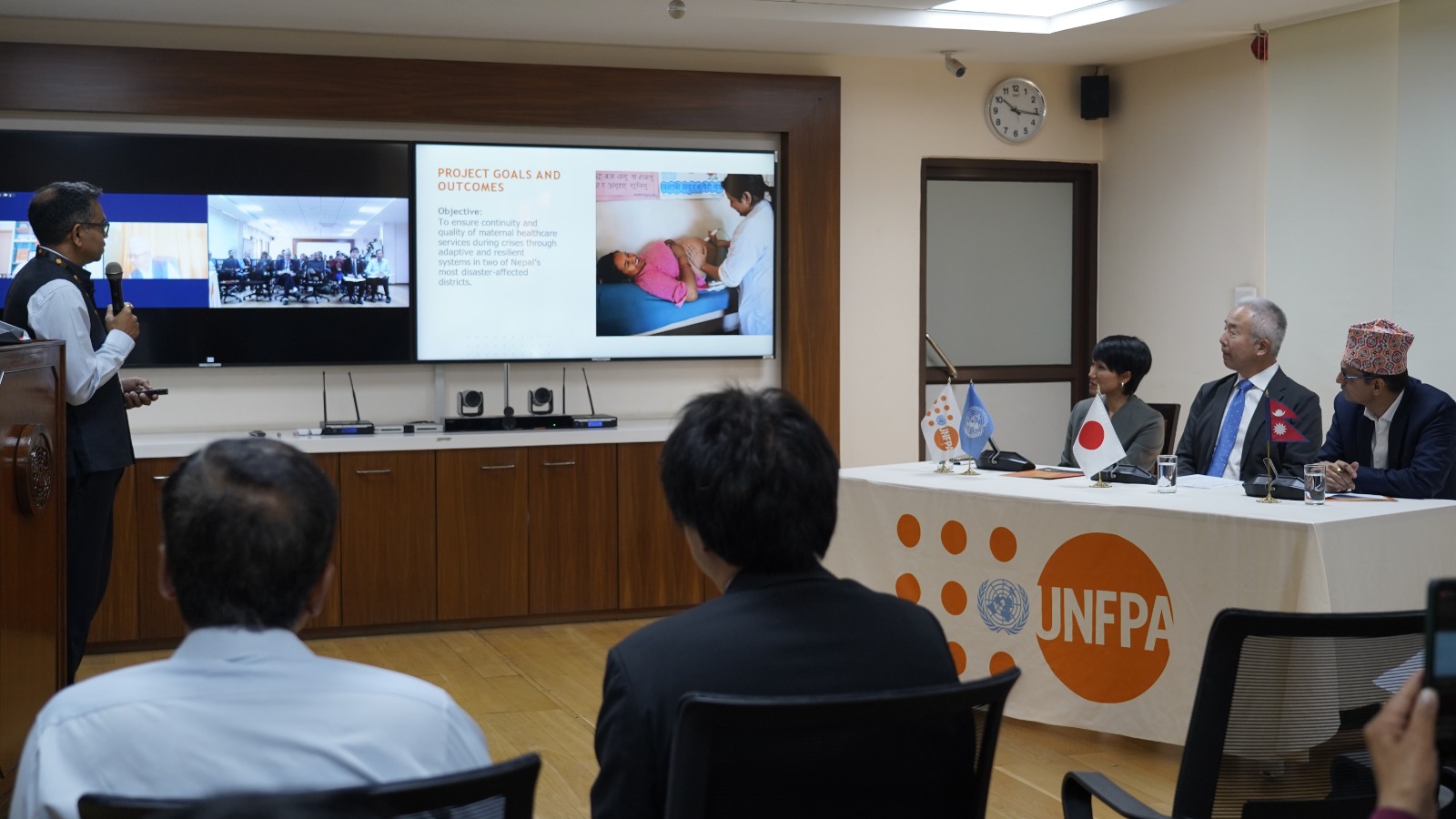On June 1, TAGNepal Treks & Expedition organised a press conference with its team that had just returned a day earlier from Tibet. It was announced that all members—nine foreigners and as many Sherpas—summited Everest. The team had climbers from Nepal, Argentina, Mexico, Malaysia, and Canada.
Three records were set on this expedition: María Alejandra Ulehla became the first Argentine woman to climb Everest from the north. And Azim Afif and Farul Aidib Bin Mahamad Yusoff were the first Malaysians to climb Everest using the Tibetan route; the latter also became the youngest Malaysian to do so.
And of course, there was Facundo Arana, the award winning actor and musician from Argentina, who summited this time–his second attempt after having to abandon his bid in 2012 due to severe altitude sickness.
He was effusive in his praise for his Nepali team members and their professionalism: “We wouldn’t have survived two days if it wasn’t for them.”
He also showed us the flag he has been taking to the summit of each mountain he climbs: to raise awareness for the importance of blood donation. He said, “In Argentina, a country of some 40 million people, when people need blood there isn’t enough. People don’t donate blood so I am taking my flag every where I can to remind people how important it is to donate blood.”
When speaking of the climbing experience, Arana said: “We had neither a scratch, nor any problem at all; we were very lucky because things were done correctly. Yes, we summited but that wasn’t the main thing, the main thing was we did it as a team, and we are all safe.”
“As we were coming to the North Col at 7,900 m the wind started blowing hard. I don’t know a lot of people who can listen to nature when it speaks. But Tendi Sherpa (the expedition leader) was standing there facing the wind, and he said, ‘We have to go down now, we are not safe here.’ So we went down, and the next day the tents in camp 2 were all destroyed.”
“I am very proud to have been a part of this wonderful expedition. It was wonderful. We support Nepal and we have many friends here.”
Tendi Sherpa, summiting for the 11th time, came up with some of the best words I’ve ever heard from a climber: “Summiting Everest is very important, but you don’t summit when you reach the top. You summit when you get down to base camp safe, and can get back home to your family.
After the press conference, OnlineKhabar sat down for an exclusive one-on-one chat with Facundo Arana. Excerpts.
Above: Arana, photographed at Kathmandu on June, 2016; photo: Shreedhar Poudel/OnlineKhabar. Opening image: Arana (extreme right), with other members of TAGNepal on the summit of Mt. Everest, May, 2016; photo: TAGNepal
I was very impressed with what you said in the press conference about Tendi Sherpa listening to the weather.
You should have seen it. Maybe this surprises you as much as it surprised me. Imagine a lion walking in the jungle. He suddenly stares at nothing…or everything. He (Tendi) put his face towards the wind, and he shut his eyes—he didn’t know that I am looking at him—and I was so looking at him. He just closed his eyes and felt it. He looked at the clouds, and after some time, said: “We go, we move.”
And believe me, I can still feel the cold and the strong wind, which would make you go inside the tent and just stay there for hours. And we have oxygen, so we are safe, and we are tired. He says no, we walk. Which was like …
Counter-intuitive?
Yes. So we walk. They lost five tents that we were supposed to stay in until the storm had passed. And this describes who our guide was. You can study as much as you want, but if you are capable of listening to nature when it speaks you are incredible!
It’s a very rare gift; it makes all the difference. I was curious about your early years. Were you always interested in extreme sports and mountaineering? Or, only recently? Or what made you have this interest?
How can I say it? You know, you just go there and see a mountain one day, and suddenly you are in love. I love nature. I love going out to the sea, to the mountains. I just love it. When I was a kid, I went into the jungle, into the forest, into the mountains, into the sea. I am curious and I love it.
Argentina has everything—the mountains, the ocean. Here we everything but the ocean.
But you have everything, and in a wild style. You don’t have guides or police or someone to help you, everywhere. It’s a huge territory.
He put his face towards the wind, and he shut his eyes… He just closed his eyes and felt it. He looked at the clouds, and after some time, said: “We go, we move.”
I read that you are also a cancer survivor – I was curious, did that make it more difficult or make you hesitant? How did it affect you?
We are all survivors of something. We are all survivors. You survive here seeing what you see. Maybe I prefer cancer on my back than to see many things that you have to see with kids. I am talking about that. We are all survivors. The good thing is that we are grown up now, we are the old ones. We are not looking at what our dad and mom do, we are the ones that ‘do’, and our kids are looking at us. So if I am a survivor of anything, it gives me the strength to take good decisions.
That’s very true. So you are also a musician, an actor? What kind?
I like living, I like playing, anything, everything.
What kind of music?
Rhythm and blues, and rock and roll, blues. I like all music. I just happen to do what I love for a living. I am very lucky. I have always known what I wanted to do, what I wanted to live for, what I wanted to do for a living.
So I just never let go. I never let go. So I am an actor, I am a singer, I am a musician, I play my saxophone, I go to mountains. First of all, of course, I have my family, a wonderful life with my wonderful wife and kids. It has no secrets. It’s just that I am lucky for having been able to not let go.
And this is the second or third time you tried for Everest?
The second, the first was in 2012.
What did you learn from the first experience that made you stronger this time? What did the first experience when you didn’t summit do for you?
It’s not about summiting – it’s about choosing well.
But it is a little bit about summiting? I am asking because you came back.
It’s not about the summit, it’s about having a good experience. I didn’t want my memories to say “Nepal, Everest, oh, coming down on a chopper.” No. Please no. I don’t want that memory. I had to come down from camp three. It was painful. You succeed when you realise that something is just not for you.
Sometimes the mountain just says no.
I’ve had in my life so many no’s. Suddenly the mountain says just no. So you have to learn to live with it. But it’s not that difficult to learn. But I didn’t want the memory—I had to come down on a helicopter; it was so much pain, and I felt so bad. I wasn’t with people that… it was a huge mistake.
So I wanted to try again. So I came with Tendi. Let’s not talk about the summit. You can’t avoid it but let’s move from there.
It was a wonderful experience. Not one discussion, not one argument. We were with people from all different countries, all together and it was wonderful, never a problem, nothing, so it’s so wonderful, and I know that it was just because it was good company.
And you know, the thing is that they are not a foreign company, they are local. And that is what makes it so good. Because you say, let’s go with this French company, this American company, blah blah blah. But no. For them(the Sherpas), this is home.
They are kings over there, you should see them on the mountain. Have you seen them? You should see them. We are all dressed, and with the oxygen, and they are over there, saying “Relax. I am going to take you,” and you are like, “Why are you without oxygen?” And they say, “Are you okay?” and turn on your oxygen.
And you are like in a fish tank, and you are there like a Martian, and they are swimming with you. “Relax, have you been able to sleep?” “No. And you?” And they say, “Yes, I slept like a baby.” It’s amazing!
That’s pretty much all the questions I had. Thank you for your time!
Thank you.






















